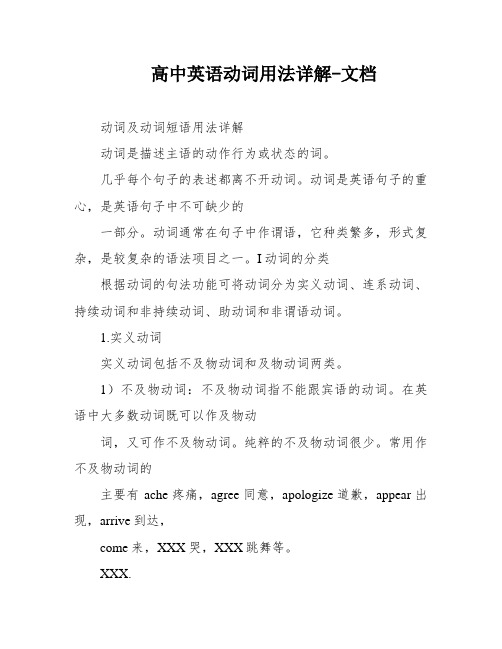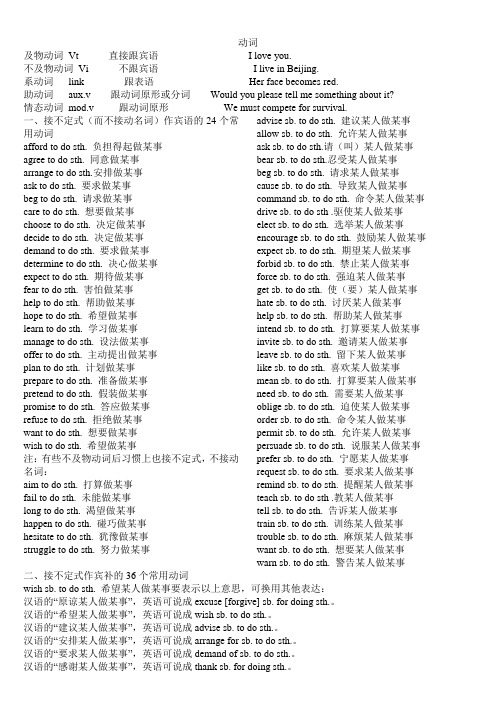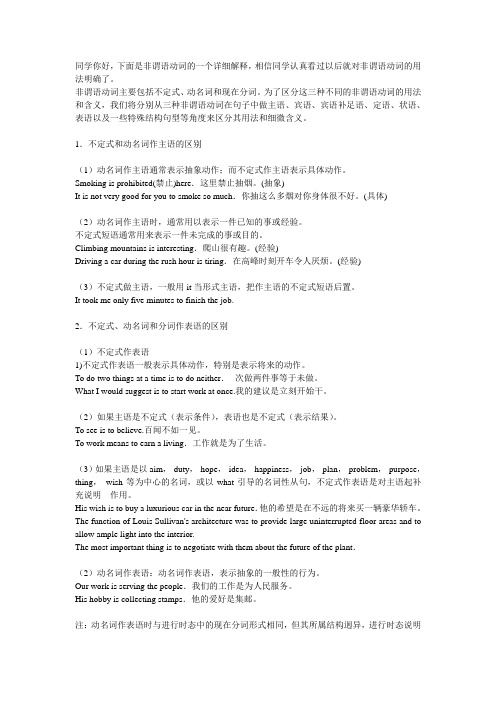动词以及动词短语的用法(动词后加to do 还是doing)
高中英语动词用法详解-文档

高中英语动词用法详解-文档动词及动词短语用法详解动词是描述主语的动作行为或状态的词。
几乎每个句子的表述都离不开动词。
动词是英语句子的重心,是英语句子中不可缺少的一部分。
动词通常在句子中作谓语,它种类繁多,形式复杂,是较复杂的语法项目之一。
I动词的分类根据动词的句法功能可将动词分为实义动词、连系动词、持续动词和非持续动词、助动词和非谓语动词。
1.实义动词实义动词包括不及物动词和及物动词两类。
1)不及物动词:不及物动词指不能跟宾语的动词。
在英语中大多数动词既可以作及物动词,又可作不及物动词。
纯粹的不及物动词很少。
常用作不及物动词的主要有ache疼痛,agree同意,apologize道歉,appear出现,arrive到达,come来,XXX哭,XXX跳舞等。
XXX.我们一直等到妈妈来。
2)及物动词:能跟宾语的动词称为及物动词。
英语中的动词大多数为及物动词。
(1)跟单宾语的及物动词只跟一个宾语的动词称为单宾语动词。
常见的单宾语动词主要有:accept接受,admire羡慕,admit承认,affect影响,afford买得起,announce公布,borrow借出,XXX埋等。
I'm sorry that I XXX.对不起我忘了你的电话号码。
(2)跟双宾语的及物动词可以同时跟两个宾语的及物动词叫双宾语动词。
双宾语中的一个宾语指人,称为间接宾语,一个宾语指物,称为间接宾语。
间接宾语普通位于直接宾语之前,也可位于其后,但此时在间接宾语的前面需加介词to或for。
直、间接宾语易位需加to的动词介词to侧重指动作的方向,表示朝着、向着、对着某人。
常见的此类动词有:tell通知,XXX借等。
Hand me that book, please.= Hand that book to me, please.请把那本书递给我。
直、间接宾语易位需加for的动词介词for侧重指动作的受益者,透露表现为或人、替或人。
动词和动词词组

知识结构网状态:b e持续:keep, last ,remain ,stay, lie,stand似乎:seem,appear感官:look,smell,taste,feel,sound系动词变成:become,grow,go,get,turn,come,fall,run证明:prove,turn out1帮助现在分词构成现在进行时2帮助过去分词构成被动语态Be 3帮助不定式构成beto do结构,表示将来,命令,征求意见,约定等。
1帮助实义动词构成疑问句,否定句助动词 do 2帮助实义动词原型构成强调式3用来代替动词按用法 have帮助过去分词构成完成时态分shall/will/would/should帮助谓语动词构成将来时态宾语及物动词双宾语复合宾语实义动词不及物动词动词情态动词延续性动词:last;keep按意义分动词和非延续性动词:die,leave,come动词词组动词+介词:look at; take on动词+副词:find out ,turn up动词词组动词+副词+介词:come up with, go in for动词+名词+介词:take part in ,take care ofBe+形容词+介词:be ready for ,be devoted to 考点一:动词及动词辨析1,achieve,gain,win,earn(1),achieve,vt. 强调通过极大努力获得或达到某事物,实现弯沉,常与一些抽象名词连用,如:success,goal(2),gain vt 指获得,赢得(尤指想要的或所需的事物)。
此外,gain 还有增加的意思 I gained the impression that the matter had been settled The plane rapidly gained height. Gain weight= put on weight(3),win vt 表示在较强的竞争中取得胜利,它通常跟的宾语有game,war ,prize, fame, battle(4),earn vt. 表示挣钱,赚工资,因自己成就行为等,得到应得的事物,博得,earn one’s living 谋生2,adapt, adjust, adopt(1),adapt 使适合,使适应 adapt (oneself)to …使自己适应。
高中英语常用动词短语(固定搭配完整版)

动词及物动词Vt 直接跟宾语I love you.不及物动词Vi 不跟宾语I live in Beijing.系动词link 跟表语Her face becomes red.助动词aux.v 跟动词原形或分词Would you please tell me something about it? 情态动词mod.v 跟动词原形We must compete for survival.一、接不定式(而不接动名词)作宾语的24个常用动词afford to do sth. 负担得起做某事agree to do sth. 同意做某事arrange to do sth.安排做某事ask to do sth. 要求做某事beg to do sth. 请求做某事care to do sth. 想要做某事choose to do sth. 决定做某事decide to do sth. 决定做某事demand to do sth. 要求做某事determine to do sth. 决心做某事expect to do sth. 期待做某事fear to do sth. 害怕做某事help to do sth. 帮助做某事hope to do sth. 希望做某事learn to do sth. 学习做某事manage to do sth. 设法做某事offer to do sth. 主动提出做某事plan to do sth. 计划做某事prepare to do sth. 准备做某事pretend to do sth. 假装做某事promise to do sth. 答应做某事refuse to do sth. 拒绝做某事want to do sth. 想要做某事wish to do sth. 希望做某事注:有些不及物动词后习惯上也接不定式,不接动名词:aim to do sth. 打算做某事fail to do sth. 未能做某事long to do sth. 渴望做某事happen to do sth. 碰巧做某事hesitate to do sth. 犹豫做某事struggle to do sth. 努力做某事二、接不定式作宾补的36个常用动词advise sb. to do sth. 建议某人做某事allow sb. to do sth. 允许某人做某事ask sb. to do sth.请(叫)某人做某事bear sb. to do sth.忍受某人做某事beg sb. to do sth. 请求某人做某事cause sb. to do sth. 导致某人做某事command sb. to do sth. 命令某人做某事drive sb. to do sth .驱使某人做某事elect sb. to do sth. 选举某人做某事encourage sb. to do sth. 鼓励某人做某事expect sb. to do sth. 期望某人做某事forbid sb. to do sth. 禁止某人做某事force sb. to do sth. 强迫某人做某事get sb. to do sth. 使(要)某人做某事hate sb. to do sth. 讨厌某人做某事help sb. to do sth. 帮助某人做某事intend sb. to do sth. 打算要某人做某事invite sb. to do sth. 邀请某人做某事leave sb. to do sth. 留下某人做某事like sb. to do sth. 喜欢某人做某事mean sb. to do sth. 打算要某人做某事need sb. to do sth. 需要某人做某事oblige sb. to do sth. 迫使某人做某事order sb. to do sth. 命令某人做某事permit sb. to do sth. 允许某人做某事persuade sb. to do sth. 说服某人做某事prefer sb. to do sth. 宁愿某人做某事request sb. to do sth. 要求某人做某事remind sb. to do sth. 提醒某人做某事teach sb. to do sth .教某人做某事tell sb. to do sth. 告诉某人做某事train sb. to do sth. 训练某人做某事trouble sb. to do sth. 麻烦某人做某事want sb. to do sth. 想要某人做某事warn sb. to do sth. 警告某人做某事wish sb. to do sth. 希望某人做某事要表示以上意思,可换用其他表达:汉语的“原谅某人做某事”,英语可说成excuse [forgive] sb. for doing sth.。
动词不定式详解 do todo doing done 解析

同学你好,下面是非谓语动词的一个详细解释,相信同学认真看过以后就对非谓语动词的用法明确了。
非谓语动词主要包括不定式、动名词和现在分词。
为了区分这三种不同的非谓语动词的用法和含义,我们将分别从三种非谓语动词在句子中做主语、宾语、宾语补足语、定语、状语、表语以及一些特殊结构句型等角度来区分其用法和细微含义。
1.不定式和动名词作主语的区别(1)动名词作主语通常表示抽象动作;而不定式作主语表示具体动作。
Smoking is prohibited(禁止)here.这里禁止抽烟。
(抽象)It is not very good for you to smoke so much.你抽这么多烟对你身体很不好。
(具体)(2)动名词作主语时,通常用以表示一件已知的事或经验。
不定式短语通常用来表示一件未完成的事或目的。
Climbing mountains is interesting.爬山很有趣。
(经验)Driving a car during the rush hour is tiring.在高峰时刻开车令人厌烦。
(经验)(3)不定式做主语,一般用it当形式主语,把作主语的不定式短语后置。
It took me only five minutes to finish the job.2.不定式、动名词和分词作表语的区别(1)不定式作表语1)不定式作表语一般表示具体动作,特别是表示将来的动作。
To do two things at a time is to do neither.--次做两件事等于未做。
What I would suggest is to start work at once.我的建议是立刻开始干。
(2)如果主语是不定式(表示条件),表语也是不定式(表示结果)。
To see is to believe.百闻不如一见。
To work means to earn a living.工作就是为了生活。
(3)如果主语是以aim,duty,hope,idea,happiness,job,plan,problem,purpose,thing,wish等为中心的名词,或以what引导的名词性从句,不定式作表语是对主语起补充说明作用。
初中英语动词和动词短语固定搭配

初中英语动词和动词短语固定搭配& prefer to do rather than do (宁愿……而不喜欢)= would rather do than do& make oneself done 使某人被……I couldn’t make myself understood/heard/seen…& have sth. done 请,让某人做什么I have my hair cut. I had my bike repaired yesterday. & please don’t sth. 对比would/could/ you please〕(not)do sth.Please don’t spit in public! =Would you please not spit in public!专门练习:A组:考查_________________ 知识1.That old man enjoys (讲)stories to children.2.He stayed in England for two years, but he isn’t good at 说English.3.I don’t feel like 吃anything.4. Would you mind ______(close) the window=(Would you mind my (me)closing the window)5. When she heard the news. She couldn’t help _______(cry)6. You have worked for a long time. What about _________(have) a rest.7. He does well in English. He practices_________(speak) English every day.8. He is busy________(do) his homework, Turn down the TV.9. He used to get up late, but now he is used to ______(get)up early.10. The book is well worth ________(read).11. He’s considering_________(go) abroad.B组:考查_________________ 知识1. It’s necessary (take)medicine on time.2.I t’s not easy so much homework in one day.A. for him to doB. of him to doC. for him doing3. It’s you to catch the thief.A. bad forB. nice ofC. easy of4. It’s very cold outside. Please tell the boy the coat.A. not to take offB. take offC. don’t put onD. not take off5. We were poor then we had no room .A. to liveB. living inC. to live inD. to stay6. I can’t drive the car, can you show me first.A. what to doB. how to doC. where to goD. what do I do7.There is a room (居住)8.He is n’t rich, he can’t afford _______(buy) the car.9. Our teacher asked us __________(not swim) in the river.10. It is not allowed __________(swim) in the river.11. ---Let’s go for a picnic! --- Sorry, I have a lot of homework______(do)C组:考查_________________ 知识1.Tom wanted to make his brother (哭),but this time he is made_______(哭)by his brother.2.Finish your homework first, or I won’t let you . A. to go out B. go out C. going out3.It’s too noisy. You’d better the radio or others will be unhappy.A.to turn downB. turn onC. turn down4.I’m very tired today. –Why a rest . A. don’t take B. not to take C. not take5. You had better __________here.A. not smokeB. don’t smokeC. not to smoke6. He dare not ________(speak) English in public.7. You needn’t ________(worry) about the final exam.8. Could you please______(open) the window.9. Would you please_______(help) me.10.* He preferred______ (stay) at home rather than______ (go) out.*He would_______(stay) at home than______(go)outC组:考查_________________ 知识1.When you leave the room, remember________(turn) off the lights.2.I remembered ______(turn)off the lights when I left the room.3.It’s cold outside, don’t forget ________(put)on the coat.4.After doing the housework, she went on __________(do)her homework.5.After two-hour walk, he stopped __________(have) a rest.6.She likes__________(read),but he doesn’t like________(read)now.7.Listen! Can you hear her ________(sing) in the room.8.We can see bees and butterflies _______(dance) among the flowers9.I often find him_______(copy)homework from others.10. When our teacher came in, we all stopped_______(talk).11.He can’t help _______ (clean)the house because she’s busy making a cake.。
高考英语语法:动词不定式 to do的各种时态语态用法详解

1.概述动词不定式to do是动词的一种非谓语形式,在句中不能单独作谓语。
动词不定式具有动词的性质,它可以有自己的宾语和状语,从而构成动词不定式短语。
它还可以有形式的变化,即一般式、进行式、完成式和完成进行时,主动式和被动式。
同时,动词不定式也具有非动词的性质,相当于一个名词、形容词或副词,可以在句中担任主语、宾语、宾语补足语、表语、定语和状语。
2. 动词不定式的构成动词不定式是由不定式符号to+动词原形构成,在某些情况下to 也可省略。
主动形式被动形式否定式一般式to do/ to be done/ not to do/ not to be done进行式to be doing/ not to be doing完成式to have done/ to have been done/ not to have (been) done完成进行式to have been doing/ not to have been doing2.1不定式的一般式to do/ to be donenot to do/ not to be done不定式的一般式表示的动作通常与主要谓语的动作同时或几乎同时发生,或是在它之后发生。
He appears to be very happy. 他看起来好像很高兴。
(同时发生)To catch the train, we'd better hurry to the station by taxi.为了赶上火车,我们最好赶紧乘出租车去车站。
(赶火车发生在到站之后)2.2不定式的进行式to be doing/ not to be doing不定式的进行式表示正在进行的或与谓语动词同时发生的动作。
It happened to be raining when I got there. 我到达那里的时候,天碰巧在下雨。
I'm glad to be traveling with you. 我很高兴和你一起旅游。
动词不定式和动名词的用法

非谓语动词不定式(infinitive)1.不定式的用法不定式的基本形式为“to do”, 在句中不单独作谓语;本身具有名词、形容词和副词的特征,在句中充当主语、宾语、表语、定语、状语和补足语。
(1) 作主语:例:To see is to believe. 眼见为实。
To grasp English in a short time is not easy.在短时间内掌握英语不容易。
注意:为保持句子平衡,可用“it”作形式主语,而将真正主语动词不定式放在后边,句型为:It is /was…to do sth.例:It is not easy to grasp English in a short time.在短时间内掌握英语是不容易的。
It was important for him to solve the problem then.当时对于他来说,解决这个问题是重要的。
(2) 作宾语:多在单宾语及物动词后用作宾语,有时也可用在某些复合宾语及物动词及个别双宾语及物动词后。
例:I want to have a walk after supper.晚饭后我想去散步。
He considered it his duty to support his family.他认为支撑他的家庭是他的责任。
She doesn’t know how to run the machine.她不知道如何操作这台机器。
不定式作宾语的结构为:及物动词+ to do. 动词常用:advise, agree, ask, begin, continue, decide, expect, forget, hope, learn, like, manage, mean, pretend, start, try, want, wish等。
(3) 作表语:联系动词一般都是be。
例:Our duty is to clean the office and the windows in it.我们的责任是打扫办公室以及把办公室里的窗户擦干净。
常见短语动词的分类和考点例析

分析 run out意思是“(某物)用完了”,是不及物短语动词,不能使用被动形式。所以“我汽车汽油用完了”应该为“the gasoline in my car ran out”,相当于“the gasoline in my car was run out of”。run across意思是“偶然碰见”,在此不符合题意。答案为C。
分析 本题是关于take构成的短语动词辨析:take in“收留;理解;包括;欺骗”;take on“开始雇用,呈现”; take to“喜欢;沉溺于;开始从事”,和take up的意思接近;take from“选自于”。本句的意思是“令我很高兴的是妻子开始喜欢六点起来慢跑了”。答案为C。
A. was broken in
B. broke into
C. was broken out
D. broke out
3. Before the final examination most students stayed up late. No wonder some of them ____.
C. on designingD. from designing
分析 本题要表达的意思是 “当我们完成我们方案的时候,他们还没有着手设计计划”。短语动词get down to(开始,着手)中的to是介词,其后的动词应该使用ing形式。答案为B。
(五) 动词+名词+介词
常见短语
get up(起床);break out(爆发);come up(出现,发生);come out(出版,发行,显露);carry out(实施);carry away(带走);hand down(传递);give up(放弃);look out(当心);look up(查阅);make up(构成);pick up(捡起;)run out(用完);take off(起飞); turn up(出现,到场);set up(创建);wash up(洗刷);look around(环视)。
- 1、下载文档前请自行甄别文档内容的完整性,平台不提供额外的编辑、内容补充、找答案等附加服务。
- 2、"仅部分预览"的文档,不可在线预览部分如存在完整性等问题,可反馈申请退款(可完整预览的文档不适用该条件!)。
- 3、如文档侵犯您的权益,请联系客服反馈,我们会尽快为您处理(人工客服工作时间:9:00-18:30)。
一动词加-ing 的情况
consider, suggest/advise,look forward to, excuse/pardon
admit,delay/put off,fancy
avoid,miss,keep/keep on,practise
deny,finish,enjoy/appreciate
forbid,imagine,risk
can't help,mind,allow/permit,escape
考虑建议盼原谅,
承认推迟没得想.
避免错过继续练,
否认完成就欣赏.
禁止想象才冒险,
不禁介意准逃亡.
如:建议:
二动词后加
①remember doing
的事,表示“不要忘记”
②forget doing。
③mean doing表示“
④regret doing
不是stop的宾语而是stop的目的状语。
”,try to do表示“设法、试图做某事”。
go on to do表示做完一件事后,接下
三动词后加to do sth.
afford负担得起agree同意appear似乎,显得arrange安排
ask问attempt企图beg请求begin开始
choose选择claim要求decide决定demand要求
desire愿望determine决定expect期望fail不能
forget忘记happen碰巧hate憎恨,厌恶hesitate犹豫
hope希望intend想要learn学习long渴望
love爱manage设法mean意欲,打算need需要
neglect忽视offer提供omit忽略,漏other扰乱;烦恼
plan计划prefer喜欢,宁愿prepare准备pretend假装
promise承诺,允许refuse拒绝regret抱歉,遗憾seek找,寻觅start开始try试图volunteer志愿want想要
wish希望
四动词后加sb to do sth. (即:v.+sb/sth+to do): advise劝告allow允许ask要求,邀请beg请求
cause引起command命令direct指导drive驱赶
enable使能够encourage鼓励entitle有资格forbid禁止
force强迫get请,得到hate憎恶help帮助
inspire鼓舞instruct指示intend想要,企图invite吸引,邀请
lead引起,使得
need需要oblige
prefer喜欢,宁愿
remind提醒request
tell告诉tempt劝诱
want想要warn告诫
五
六to
be given to
be related to 与…
be addicted to
录取;准进入
be adjusted to 适应
be known to 为…所知
be married to 和…结婚
be sentenced to被判处
be connected to 和…连在一起
be exposed to 暴露于;遭受
be compared to 被比喻成
compare… to…把…比作…
be engaged to 与…订婚
be / become / get accustomed to // accustomed to 惯于;有…习惯
be engaged to 与…订婚
get down to 着手做
lead to 导致
object to反对;不喜欢;不赞成put one’s mind to全神贯注于give rise to 引起
look forward to 盼望
stick to 坚持
pay attention to 注意
attend to 专心;注意;照料see to 负责;注意
contribute to对…
apply oneself to
come close to
reply to 回答
add to 增加
|]。
